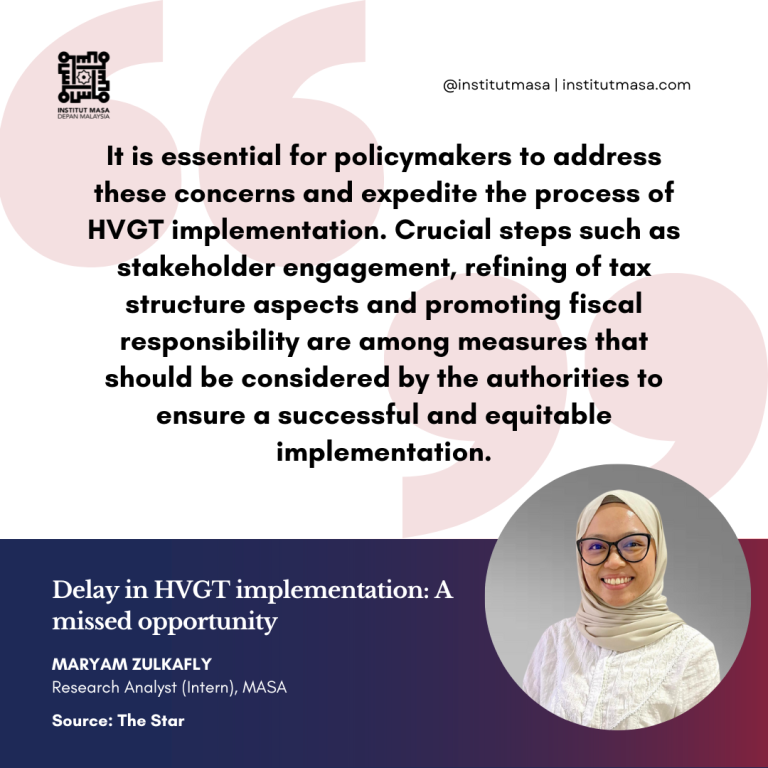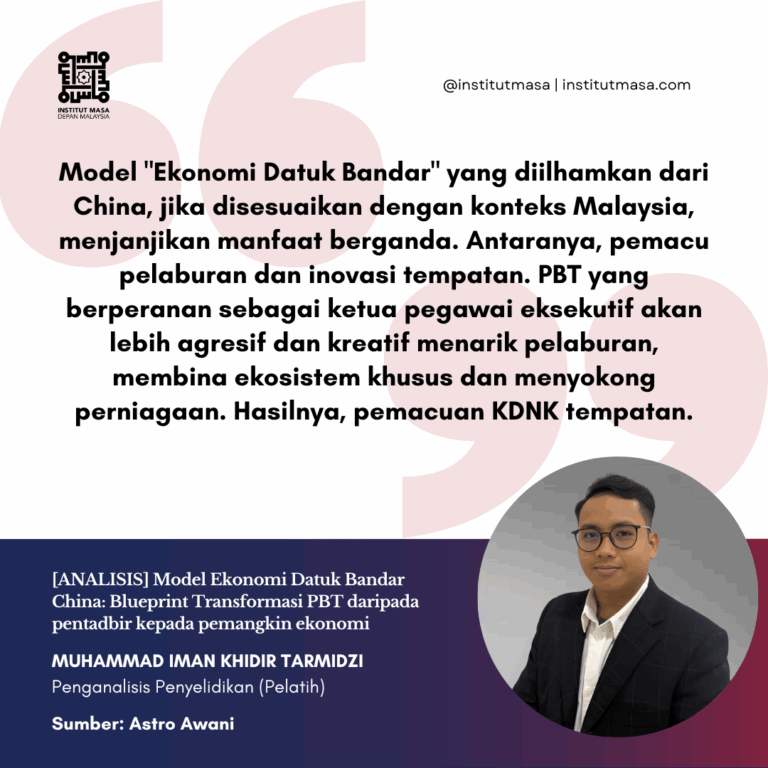Oleh Maryam Zulkafly
Keputusan kerajaan menangguhkan pelaksanaan Cukai Barang Bernilai Tinggi (HVGT) yang pada asalnya dijadualkan awal bulan ini mendapat pelbagai reaksi.
Ada pihak berpandangan ia satu langkah berhemat untuk membolehkan perbincangan lebih lanjut dilakukan bersama pihak berkepentingan dan industri.
Ada juga pihak menyifatkan penangguhan itu melepaskan peluang keemasan bagi menangani kesenjangan kekayaan dan meningkatkan hasil kerajaan yang boleh digunakan untuk program kebajikan sosial negara.
Penangguhan HVGT menimbulkan pelbagai isu memerlukan pertimbangan teliti dan komprehensif. Paling utama, ia mencetuskan kebimbangan mengenai komitmen dan perancangan kerajaan merapatkan jurang kekayaan semakin melebar.
Oleh itu, penangguhan pelaksanaannya menimbulkan persoalan mengenai komitmen kerajaan untuk menangani kesenjangan kekayaan dalam kalangan rakyat dan mewujudkan mekanisme cukai lebih saksama.
Konsep percukaian ini dilaksanakan di beberapa negara seperti Korea Selatan dan Turki dengan mengenakan cukai barangan mewah antara 2.5 hingga 55 peratus seperti mesin slot, barang kemas, mutiara, jam tangan mewah dan beg mewah.
Berdasarkan laporan Morgan Stanley, sebuah bank pelaburan multinasional di Amerika Syarikat (AS), Korea Selatan merekodkan hasil cukai ini mencecah RM80.25 bilion (AS$16.8 bilion) pada 2022, peningkatan 24 peratus setiap tahun.
Namun, terdapat beberapa negara gagal meneruskan pelaksanaannya. Contohnya, sistem percukaian AS, menyebabkan kehilangan ribuan pekerjaan akibat perniagaan industri berkaitan terjejas teruk.
Beri impak ekonomi lebih luas
Di United Kingdom pula cukai nilai tambah (VAT) lebih tinggi diperkenalkan untuk sebahagian besar barangan dan perkhidmatan, termasuk barangan mewah.
Penangguhan HVGT di negara ini akan memberi impak ekonomi lebih luas dan negatif terhadap penjanaan hasil, kemampanan fiskal dan keupayaan kerajaan memerangi rasuah serta meningkatkan kecekapan tadbir urus.
Kelewatan pelaksanaannya juga amat terasa dalam aspek perniagaan dan kos sara hidup apabila sesetengah pihak menganggap pendekatan berhati-hati kerajaan sebagai taktik politik hanya menguntungkan golongan kaya, khasnya T20.
Amat penting bagi penggubal dasar menangani keresahan ini dan mempercepatkan pelaksanaan HVGT. Antara langkah boleh diambil adalah melalui pembabitan berterusan bersama pihak berkepentingan dalam memperhalusi struktur cukai dan menggalakkan tanggungjawab fiskal bagi memastikan pelaksanaan secara total dan saksama.
Takrifan dan kriteria barangan bernilai tinggi serta julat harga bagi barangan bercukai perlu dikenal pasti dengan segera. Kurang maklumat serta penjelasan sistem percukaian ini menyebabkan kekeliruan peruncit dan pengguna.
Kerajaan perlu berhati-hati dalam memantau potensi kesan ekonomi, sosial dan politik serta bersedia bertindak untuk membuat sebarang bentuk pelarasan diperlukan bagi menangani permasalahan ekonomi semakin meruncing.
Sebelum ini, kerajaan dilapor merancang mengenakan cukai antara lima hingga 10 peratus ke atas barangan mewah, berupaya menjana tambahan pendapatan tahunan kepada RM700 juta.
Walaupun HVGT dirangka untuk menambah hasil kerajaan dan menangani cabaran ekonomi dengan menyasarkan barangan mewah dan aset bernilai tinggi, amat penting untuk mencapai keseimbangan antara penjanaan hasil dan melindungi kepentingan pengguna serta perniagaan barangan mewah bagi menggalakkan pertumbuhan ekonomi Malaysia.




